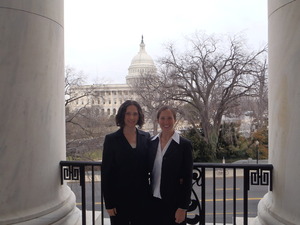Check out this blog post from Michael Dupor, University of Wisconsin, sharing his experience completing the AVMA Government Relations Student Externship Program!
If you’re like most Americans, you probably think of Washington D.C. with some mixture of frustration, disgust, exasperation, worry and resentment. For this bright-eyed veterinary student/policy nerd, however, Washington D.C. represented a one-of-a-kind opportunity. An externship where I could understand the process and meet the people that shape policy in our country, and to help give veterinarians a voice on Capitol Hill.
I am in my fourth year at the University of Wisconsin, on a food animal track. I plan to enter food animal practice after graduation. Given that, it may seem odd that I decided to take a break from my busy schedule of palpating and cutting DAs in rural Wisconsin to spend a month in a suit and tie in Washington DC. My interest in this externship was piqued by a lifelong passion for public affairs and policy, and specifically a desire to learn more about agricultural policy.
I learned a ton about policy during this externship. Specifically, I spent time taking notes in Congressional hearings, reading proposed legislation and appropriations requests, meeting with members of Congress and their staffs, and attending policy seminars and panel discussions. I also had the chance to sit in on several AVMA committee meetings. There, practicing veterinarians from across the country and a variety of fields debated what positions the AVMA should take on upcoming legislation, with topics ranging from pesticide use to lab animal welfare to student loan debt.
I spent a lot of time discussing the shortage of rural veterinarians and encouraging support for programs to strengthen the Veterinary Medical Loan Repayment Program. The program helps food animal veterinarians working in underserved rural areas pay down debt, and, incidentally, is a program I am hoping to take advantage of. I enjoyed the opportunity to meet with several of my state’s legislators and other farm-state representatives to discuss the importance of veterinarians to a robust rural economy.
I also had the chance to meet veterinarians in a wide variety of careers. Members of Congress, colonels, lobbyists, researchers, administrators, policy analysts, public health workers, disease investigators and trade experts are just a few of the roles that veterinarians working in public practice can fill. It was fascinating to see the doors that a veterinary degree can open for you. Most of the people I met loved what they did and were thrilled to be able to share their stories with a curious student. One of the qualities that impressed me most about the politicians, scientists, policymakers and veterinarians that I met over the course of my externship was their commitment to service (yes, even the politicians). Most shared a desire to be a part of something bigger than themselves, to ensure that policy is based on good science, and to ensure that government is directed in a way that benefits all Americans.
The other thing that stuck out to me was the different paths that they had followed to get to where they were. Some entered government right out of school, others transitioned after decades in practice, and some never left practice, preferring to work on policy as a volunteer. Nonetheless, all these veterinarians have realized the value of their experience and education in policymaking and the importance of our profession having a strong voice on Capitol Hill. What it really showed to me was that there are so many ways to be involved in shaping the decisions that affect the future of our profession and country, and that it is never too late to get started.
Given some of today’s heated partisan bickering, it is so easy to become jaded or just tune politics out. It is important to remember the countless clever, passionate, hard-working people who ignore politics and work tirelessly behind the scenes that make up our government. But it is also important to remember that our system of government places an incredible amount of faith and responsibility in its citizens. None of this works if people like you and me don’t step up and make our voices heard. We need more leaders with flexibility, animal and public health knowledge, and the ability to think independently and critically. As veterinarians, we are uniquely suited to fill that need, in non-profits, in community and professional organizations, and in government at all levels. I encourage everyone reading this to consider ways in which you could put your passion, interests and skills to use helping strengthen our profession, communities and nation. And if you are a student reading this, there’s a pretty cool externship out in DC that is a great way to get started.
 Sunday, June 20, 2021 at 01:00PM
Sunday, June 20, 2021 at 01:00PM 
 Photography,
Photography,  Washington DC in
Washington DC in  News,
News,  Photography
Photography 





